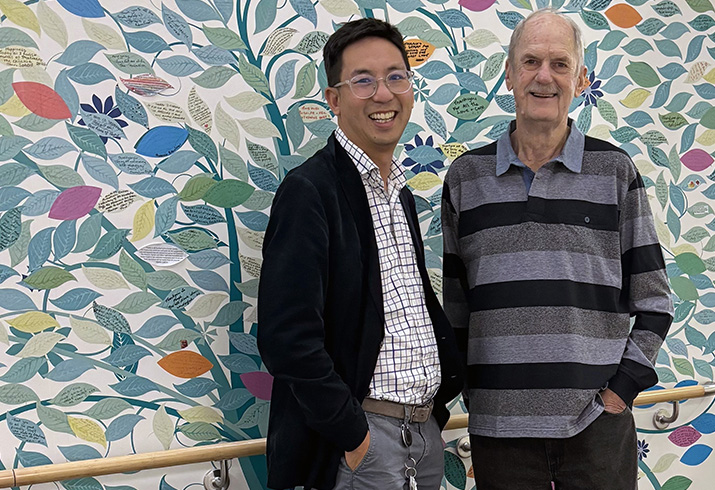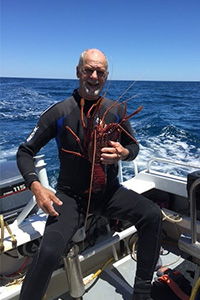Mesothelioma biobank research to help patients like Barry
 Dr Wei-Sen Lam with Barry
Dr Wei-Sen Lam with Barry
For Barry of Bullcreek, a new biobank for research into mesothelioma, a devastating cancer caused by asbestos exposure, gives him hope that future sufferers of the disease will live longer to spend their days diving and fishing, as he now does.
Despite the asbestos ban, mesothelioma still affects Australians. Diagnosed with mesothelioma in 2021, Barry was initially symptomless and discovered he had the cancer through a routine heart check.
“The diagnosis was a shock initially, but I received excellent care and treatment through Fiona Stanley Hospital (FSH),” Barry said.
While Barry’s cancer was detected early, he was not initially expected to survive beyond a year, yet with chemotherapy, immunotherapy, and radiation, he is still now enjoying life, diving in Mandurah and taking regular fishing holidays in Broome with his wife Shirley.
To improve outcomes for patients like Barry, FSH researchers are contributing to the National Centre for Asbestos Related Diseases (NCARD) Biobank, which collects and stores patient samples as a resource for mesothelioma research.
FSH Principal Investigator of the NCARD Biobank, Dr Wei-Sen Lam said the biobank facilitates mesothelioma research by supporting breakthroughs in earlier treatment and diagnosis.
“FSH will contribute tissue and blood samples to the biobank from patients, which we hope over time will unlock the underlying mechanisms driving mesothelioma development and progression,” Dr Wei-Sen said.

“Improving early detection and developing more personalised treatments could make a real difference for people with mesothelioma. Through identifying reliable biomarkers and better understanding treatment responses, we hope to offer patients more choices, better quality of life, and improved outcomes.”
Barry said he hopes the NCARD Biobank will help with early detection so that other sufferers of mesothelioma can live longer like he has.
“My advice to future sufferers is to get regular health checks and act on any symptoms early, and, like I have – keep on living life to the full,” Barry said.
Dr Wei-Sen collaborates on this research with NCARD’s Professor Jenette Creaney, Sir Charles Gairdner Hospital Clinical Research Assistant, Dr Tina Firth, as well as The University of Western Australia and Pathwest.
The biobank has been partially funded by a National Health and Medical Research Council Centre of Research Excellence grant. Read more about the NCARD Biobank (external site) and current NCARD Biobank projects (external site).
Keep up to date with our news and achievements
Find out more on Facebook (external site) or LinkedIn (external site)

